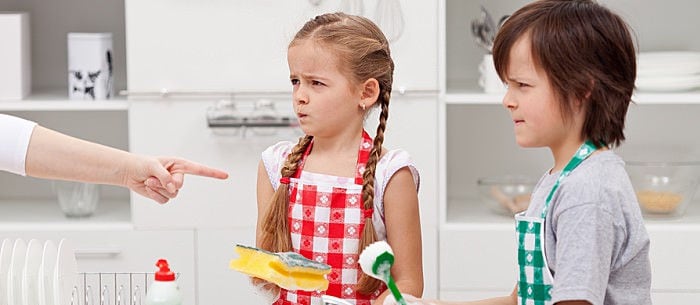You ask your son to set the table, and he replies, “You set it! Why do I have to do it?” You stand your ground and insist that he sets the table or he can’t have dessert. Then he hurls an “I hate you!” in your direction before stomping out of the room.
What went wrong here?
At some point in their lives, most kids rebel to test the boundaries of the household. Even if you’re consistently respectful, you’ll probably still run into back talk occasionally — and that’s normal. However, your reaction to your child’s sass can have a big influence on how he processes emotions, and it can set the stage for your future relationship with your child. Here are some reasons why kids talk back and some tips from our experts for how to respond appropriately.
Why Do Kids Use Back Talk?
Kids often don’t think of their words as being disrespectful, says Dr. Laura Markham, author of “Peaceful Parent, Happy Kids.” Instead, they’re feeling powerless or think that you’re being unfair. “Think about it from the child’s perspective,” says Brenna Hicks, licensed mental health counselor, play therapist and blogger at The Kid Counselor. “They’re very seldom given the freedom to make choices themselves, and it’s understandable that children would voice opposition to that.” Some of what we call back talk is actually just a child’s way of expressing himself. The challenge for the parent or caregiver is to guide the child into expressing his emotions respectfully, instead of letting them turn into a spoiled brat.
It’s also important to remember that your child’s frontal cortex, which regulates his emotions, is extremely underdeveloped, says Dr. Markham. Sure, it’s easy for your child to behave when he’s happy. But when he gets upset, he’s unable to control his emotions, so the resulting disrespect is tough for him to keep in check.
Concerned about disrespectful behavior? Check out these 7 Signs Your Kid is a Brat.
How Should You Respond to Back Talk?
Instead of flying off the handle at your child, follow these steps to dealing with disrespect, advise Dr. Markham and Hicks:
- Stay Calm
It can be tempting to respond to disrespectful words with anger: “Don’t you dare say that again, young man! Go straight to your room!” The problem is that our aggressiveness escalates the power struggle. “We always feel we have to meet aggression with aggressive words ourselves,” says Dr. Markham. “We think it will improve the situation, but it actually inflames it, making our children feel like they were right to use those words with us.” If you want to raise a calm child, you’ll need to stay calm first.
- Empathize
Change your attitude by understanding that back talk is a sign that your child is upset and needs your help, rather than a personal attack. Instead, empathize: “I know that you don’t want to clean up your toys right now. You wish you could keep on playing forever.”
- Set a Respectful Limit
Let your child know that it’s okay to be angry, but it’s not okay to sass you: “You must be very upset if you’re speaking to me that way. That’s not the way we speak in this house.”
- Encourage Alternative Ways of Communication
At this point, you can help your child deal with his emotions in a productive way: “Can you talk to me about what made you so angry?”
- Teach a Lesson
Later, after both of you have calmed down, you can discuss what happened. Talk to your child about how disrespectful words and actions such as eye-rolling can hurt others’ feelings and make them less likely to listen to what you have to say.
Because children are usually lashing out in order to express their feelings, the situation typically doesn’t escalate unless the parent becomes upset and turns the situation into a power struggle, Hicks says. That doesn’t mean that your child will never speak to you with disrespect again, of course. It means that you’ll be allowing your child to express his emotions and teaching him the appropriate way to say something. In the long run, the lessons in respectful communication that you’re teaching your child will form the adult that he becomes.
Kiddos seem stuck in their ways? Read What if My Child Is Stubborn?
Keren Perles is a parenting writer and the founder of Heart and Mind Parenting. Her three young boys give her plenty of practice in dealing with childhood misbehaviors.






